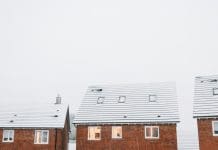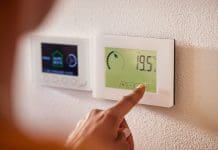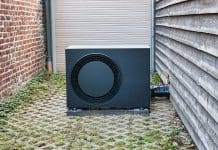The Energy Saving Trust examine solid wall insulation and what opportunities it has for UK homes along with what households should consider.
It goes without saying that more expensive measures will provide the greatest savings and warmest homes. Unsurprisingly, millions of households have installed cavity wall installation which offers a very good energy saving payback, while practically every home in the UK now has some form of loft insulation installed.
This is good news for the UK but there are still millions of homes with solid walls that could still benefit from wall insulation. Only three per cent of solid wall properties have solid wall insulation, despite solid walls letting through twice as much heat as cavity walls do. There is an opportunity here to dramatically improve the UK’s housing stock through solid wall insulation either on the inside (internal wall insulation) or outside (external wall insulation) of properties.
With many homes that could still benefit, but limited government funds to support solid wall insulation, there is a need to target those homes that could benefit the most. Finding these households most in need is not always simple. Luckily more and more data is available about the UK’s housing stock, such as the Energy Saving Trust’s Home Analytics, which can be used to focus insulation activity on the coldest and most expensive to heat homes, along with the most vulnerable households, to make the most of any government support on offer.
The energy savings associated with solid wall insulation is high – around £270 a year in the average three-bed semi-detached home or even £460 a year in a detached home, with carbon savings between 1,000 and 2,000 kg. However, the up-front costs are high and vary significantly depending on the level of work required in the home. External wall insulation could cost anywhere between £9,000 and £26,000 while internal wall insulation is between £4,000 and £16,000. Another barrier is the hassle associated with the works, with households not wanting the disruption to the home that comes with solid wall insulation.
Luckily, there are ways to remove these barriers. If households are looking for cheaper rates, fitting the insulation work in line with other home improvements will save money on the job and spread the cost of the insulation, while also removing the hassle and disruption barriers. For example, if households are planning a new kitchen or bathroom, then it might be a great time to also explore internal wall insulation.
Households are three times as likely to consider energy efficiency upgrades alongside other home improvements, works and renovation projects, while 85 per cent of UK households would stretch their budget on home improvements to pay for energy efficiency measures and upgrades. This should be seen as an opportunity for installers who could sell energy efficiency measures alongside wider home retrofits.
Another important consideration with solid wall insulation is making sure it complies with Building Regulations. Normally the installer will ensure that the insulation is up to standard and will arrange approval from the local Building Control Office. However, if they are not going to do this, then the Building Control Office should be contacted at an early stage to make sure the proposed works comply.
For solid wall insulation the homeowner will need to employ a professional installer, with external wall insulation required to be fitted by a specialist installer trained by an approved system designer. Homeowners can search for companies that specialise in solid wall insulation through the National Insulation Association (NIA) and Insulated Render & Cladding Association (INCA) websites. If the internal wall insulation works coincides with other building work then the homeowner might want to ask the same builder to do the insulation, but it’s important to check that they have experience in fitting internal insulation. ■
For more information about solid wall insulation visit http://www.energysavingtrust.org.uk/Insulation/Solid-wall-insulation
. . . . . . . . . . . . . . . . . . . . . . . . . . . . . . . . . . . . . . . . . . . . . . .
Energy Saving Trust
www.twitter.com/EnergySvgTrust















piecemeal solid wall insulation spells distaster. the costs quoted seem very low – installation only and not making good? It is a very important form of insulation and makes a huge difference, but there is much scope to get it wrong ( in the way that we have lots of insulated roofs with no ventilation and poor cavity wall insulation – even timber frames ! all by trained installers)
depending on the insulant and wall substrate there can be wall breathability issues which is important on older buildings with thick walls.
Approaching on this basis does not inspriore confidence – a more ” joined up” vision is required.